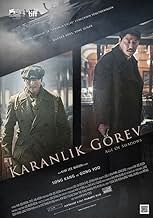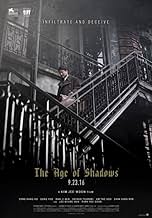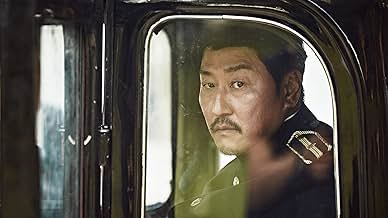VALUTAZIONE IMDb
7,1/10
11.703
LA TUA VALUTAZIONE
I combattenti della resistenza coreani contrabbandano esplosivi per distruggere le strutture controllate dalle forze giapponesi.I combattenti della resistenza coreani contrabbandano esplosivi per distruggere le strutture controllate dalle forze giapponesi.I combattenti della resistenza coreani contrabbandano esplosivi per distruggere le strutture controllate dalle forze giapponesi.
- Regia
- Sceneggiatura
- Star
- Premi
- 16 vittorie e 41 candidature totali
Recensioni in evidenza
This film has strong commercial potential because of its suspenseful narrative structure; the bravado cinematography and editing; the strong acting; the powerfully evocative production design; and the effective musical score. Loved the entire look of the film. Love the sepia tone, the 1920s period costumes and sets, the compelling storyline, and the circularity of the narrative structure. To me, the strongest storytellers working today in cinema are from Asia, and that makes me so very happy as Asian cinema has lost a lot of its standing in World Cinema without the post-War (II) Japanese masters.
Score Grid (out of 4)
Script/Story: 4
Cinematography/Visual Effect: 4+
Editing: 4
Sound/Musical Score: 4
Production Design: 4+
Acting/Performance: 4
Recommend the film? Absolutely. This foreign film has the appeal of today's Hollywood products: the action, suspense, music, etc. The operatic concluding scene -- underscored by Ravel's Bolero -- owes so much to both Scorsese and FFCoppola. Also to Andrze Wajda really in look and feel; wonder if Kim Jee-woon is familiar with the Polish master's work?
Thumbs way up!
Score Grid (out of 4)
Script/Story: 4
Cinematography/Visual Effect: 4+
Editing: 4
Sound/Musical Score: 4
Production Design: 4+
Acting/Performance: 4
Recommend the film? Absolutely. This foreign film has the appeal of today's Hollywood products: the action, suspense, music, etc. The operatic concluding scene -- underscored by Ravel's Bolero -- owes so much to both Scorsese and FFCoppola. Also to Andrze Wajda really in look and feel; wonder if Kim Jee-woon is familiar with the Polish master's work?
Thumbs way up!
"The Age of Shadows" is a historically inspired dramatic action-thriller about a group of Korean resistance fighters who are opposing the peninsula's Japanese occupation. Directed and written by creative mastermind Kim Jee-won and starring South Korean top actors like Lee Byung-hun, this epic film became South Korea's official submission for the "Best Foreign Language Film" category of the 89th Academy Awards in 2017. While the premises seemed to be very positive, I was slightly disappointed by the movie.
First of all, a much better movie with a very similar story line called "Assassination" was released only one year earlier and it beats this flick in terms of acting, pace, settings and story. It's quite difficult to identify with the main character in "The Age of Shadow" who constantly changes sides and doesn't seem to know what he believes in. Instead of portraying a man torn between two choices, the movie focuses on a rather antipathic and egoistic character who is thinking about his own advantage at all times. Even an outstanding actor like Song Kang-ho can't make this dull main character any more exciting.
"The Age of Shadow" starts with an explosive opening scene only to lead towards a lengthy introduction with endless dialogues and numerous characters. It takes close to one hour before the pace quickens up again. The first half of the movie is definitely too long and often lost my interest.
While the settings of the movie are very realistic and bring to life a genuine depiction of the Korean peninsula in the forties, the costumes and locations aren't as detailed and memorable as in many other South Korean high-quality productions.
The story remains somewhat shallow in my opinion. It's obvious that the members of the resistance are trying to attack the Japanese occupants but the film never really explains what they are organizing precisely. It's quite unsatisfying to realize that the resistance's charismatic leader is taking many risks by trusting a highly unreliable main character and personally organizing an attack against the enemy that is never ever specified. The ending also leaves many questions open and feels unfinished to me.
Despite these flaws, the movie also has many strong points. The side characters are portrayed excellently and add some depth to the movie. Especially the clever villain portrayed by Um Tae-goo is very creepy. The movie also convinces in its more intense passages. The opening scene is both dynamic and memorable. The climax on the train is very tense and will get you on the edge of your seat. The last thirty minutes of the film have a welcome dramatic and emotional touch. The settings are authentic and especially the scenes on the train, in different torture chambers and in the prison are beautifully crafted and provide a gripping and sinister atmosphere. While the story is maybe the movie's biggest flaw, it still requests some thinking from the audience and includes a few minor twists in the second half of the film that save this movie for me.
Maybe my rating would be slightly more generous if the excellent "Assassination" hadn't been released a year earlier. That film's excellent execution from any point of view makes "The Age of Shadows" look quite predictable, redundant and even unnecessary. Faithful fans of contemporary South Korean cinema should still watch both movies but I would only recommend "Assassination" to occasional international audiences. "The Age of Shadows" really pales in comparison to Choi Dong-hoon's "Assassination". On a closing note, South Korea should have chosen the outstanding horror film "The Wailing" as official submission for the "Best Foreign Language Film" category of the 89th Academy Awards in 2017.
First of all, a much better movie with a very similar story line called "Assassination" was released only one year earlier and it beats this flick in terms of acting, pace, settings and story. It's quite difficult to identify with the main character in "The Age of Shadow" who constantly changes sides and doesn't seem to know what he believes in. Instead of portraying a man torn between two choices, the movie focuses on a rather antipathic and egoistic character who is thinking about his own advantage at all times. Even an outstanding actor like Song Kang-ho can't make this dull main character any more exciting.
"The Age of Shadow" starts with an explosive opening scene only to lead towards a lengthy introduction with endless dialogues and numerous characters. It takes close to one hour before the pace quickens up again. The first half of the movie is definitely too long and often lost my interest.
While the settings of the movie are very realistic and bring to life a genuine depiction of the Korean peninsula in the forties, the costumes and locations aren't as detailed and memorable as in many other South Korean high-quality productions.
The story remains somewhat shallow in my opinion. It's obvious that the members of the resistance are trying to attack the Japanese occupants but the film never really explains what they are organizing precisely. It's quite unsatisfying to realize that the resistance's charismatic leader is taking many risks by trusting a highly unreliable main character and personally organizing an attack against the enemy that is never ever specified. The ending also leaves many questions open and feels unfinished to me.
Despite these flaws, the movie also has many strong points. The side characters are portrayed excellently and add some depth to the movie. Especially the clever villain portrayed by Um Tae-goo is very creepy. The movie also convinces in its more intense passages. The opening scene is both dynamic and memorable. The climax on the train is very tense and will get you on the edge of your seat. The last thirty minutes of the film have a welcome dramatic and emotional touch. The settings are authentic and especially the scenes on the train, in different torture chambers and in the prison are beautifully crafted and provide a gripping and sinister atmosphere. While the story is maybe the movie's biggest flaw, it still requests some thinking from the audience and includes a few minor twists in the second half of the film that save this movie for me.
Maybe my rating would be slightly more generous if the excellent "Assassination" hadn't been released a year earlier. That film's excellent execution from any point of view makes "The Age of Shadows" look quite predictable, redundant and even unnecessary. Faithful fans of contemporary South Korean cinema should still watch both movies but I would only recommend "Assassination" to occasional international audiences. "The Age of Shadows" really pales in comparison to Choi Dong-hoon's "Assassination". On a closing note, South Korea should have chosen the outstanding horror film "The Wailing" as official submission for the "Best Foreign Language Film" category of the 89th Academy Awards in 2017.
Well, that was a lot of fun. The Age of Shadows is a spy thriller that is basically a ticking bomb and once things go wrong, it just gets brutal and chaotic. The set up for these characters and their plot is well put together enough to be engrossing. And the set pieces are just excitingly executed. The film is unafraid of showing something terrible from their consequences. Though there is one point at the third act where I wished the film had ended. It gets to feel a little too long as it goes on, but man, the train sequence alone is one hell of an exercise for suspense. The production is also too impressive and the acting is quite engaging. Overall, it's a dark and brutal, yet quite an edge of your seat cinematic thrill ride.
South Korean thrillers rarely misfire even if they aren't that well reviewed or rated. Coming for Kim Jee-woon, who masterfully directed "I Saw the Devil" and "A Bittersweet Life", "The Age of Shadows" makes a notable entry to his filmography. The Western audience doesn't really get to see period South Korean film set in early 20th century and it gives us a chance to perceive life on the Eastern front.
"The Age of Shadows" takes place in the 1920's around a back-and-forth game between a group of resistance fighters and Japanese agents. The film is deeply rooted in the Korean independence movement from the Empire of Japan. While most of the people back home wanted to gain independence, they could not do anything in front of the strong Japanese authorities. The key was to form resistance groups to overtake the Japanese dominion.
The film stars two of South Korea's biggest actors working in the industry today, Song Kang-ho and Lee Byung-hun. They have paved the way of the South Korean new wave by delivering outstanding performances that helped the film industry achieve new heights. In "The Age of Shadows" they play on the opposite side of the fences, Song as a Korean police officer charged to sniff out the resistance and Lee as the leader of the resistance fighters. Lee's character begins to sense that the police officer can turn ways and be persuaded to help the resistance by feeding them information. At this point the wheels start to be in motion and it will be a very bumpy and eventful train ride, literally.
"The Age of Shadows" is a good period thriller with twists and turns that will keep you entertaining until the end.
"The Age of Shadows" takes place in the 1920's around a back-and-forth game between a group of resistance fighters and Japanese agents. The film is deeply rooted in the Korean independence movement from the Empire of Japan. While most of the people back home wanted to gain independence, they could not do anything in front of the strong Japanese authorities. The key was to form resistance groups to overtake the Japanese dominion.
The film stars two of South Korea's biggest actors working in the industry today, Song Kang-ho and Lee Byung-hun. They have paved the way of the South Korean new wave by delivering outstanding performances that helped the film industry achieve new heights. In "The Age of Shadows" they play on the opposite side of the fences, Song as a Korean police officer charged to sniff out the resistance and Lee as the leader of the resistance fighters. Lee's character begins to sense that the police officer can turn ways and be persuaded to help the resistance by feeding them information. At this point the wheels start to be in motion and it will be a very bumpy and eventful train ride, literally.
"The Age of Shadows" is a good period thriller with twists and turns that will keep you entertaining until the end.
Mil Jeong (밀정 ~ The Age of Shadows).
Viewed at 2016 Venice FilmFestival. Tremendous Korean epochal drama about life and resistance under the oppressive Japanese occupation in the early decades of the century. Director Kim Jaewoon really knows how to set up drama and suspense mixed with blazing action. There was so much in this film that I felt like I was watching a Beethoven symphony. Dark Sepia toned photography used to good effect enhances period feel. Musical soundtrack employs jazz and adrenaline tensor stretches and the final shootout in the train station is orchestrated deftly to Ravel's Bolero.
139' running time is long and winds up with several anticlimactic codas but never lets you out if its grip. For Koreans this is clearly a film with heavy patriotic messages. The final theme is "Don't let your failures stop you -- build on them and rise to the next level" -- until victory is achieved. I would love to see this film with a Korean audience and would expect to see people on their feet cheering at the end... A young Italian I met afterwards said he loved it even though he knows nothing of the history involved. I could easily see why -- in a way this is something like a Kimchee spaghetti western and charismatic actor Kang-ho Song, 49, has got to be the Korean equivalent of John Wayne, or at least, Robert Mitchum.
Viewed at 2016 Venice FilmFestival. Tremendous Korean epochal drama about life and resistance under the oppressive Japanese occupation in the early decades of the century. Director Kim Jaewoon really knows how to set up drama and suspense mixed with blazing action. There was so much in this film that I felt like I was watching a Beethoven symphony. Dark Sepia toned photography used to good effect enhances period feel. Musical soundtrack employs jazz and adrenaline tensor stretches and the final shootout in the train station is orchestrated deftly to Ravel's Bolero.
139' running time is long and winds up with several anticlimactic codas but never lets you out if its grip. For Koreans this is clearly a film with heavy patriotic messages. The final theme is "Don't let your failures stop you -- build on them and rise to the next level" -- until victory is achieved. I would love to see this film with a Korean audience and would expect to see people on their feet cheering at the end... A young Italian I met afterwards said he loved it even though he knows nothing of the history involved. I could easily see why -- in a way this is something like a Kimchee spaghetti western and charismatic actor Kang-ho Song, 49, has got to be the Korean equivalent of John Wayne, or at least, Robert Mitchum.
Lo sapevi?
- QuizThis film is Warner Bros. first Korean production.
- BlooperIn the train one of the resistance members open the pocket watch with QUARTZ inscription on dial. Second hand of the watch moves in distinct steps reaffirming they have a quartz movement inside. Quartz watch was not invented in 20s and was not available till late 60s.
- Citazioni
Jung Chae-San: Even when we fail, we move forward. The failures accrue, and we tread on them to advance to higher ground.
- Curiosità sui creditiThe Warner Bros logo is set on a quiet street.
- ConnessioniFeatured in Boléro, le refrain du monde (2019)
- Colonne sonoreWhen you're smiling
Written by Larry Shay (uncredited), Mark Fisher (uncredited) and Joe Goodwin (uncredited)
Performed by Louis Armstrong
I più visti
Accedi per valutare e creare un elenco di titoli salvati per ottenere consigli personalizzati
- How long is The Age of Shadows?Powered by Alexa
Dettagli
- Data di uscita
- Paesi di origine
- Siti ufficiali
- Lingue
- Celebre anche come
- The Age of Shadows
- Luoghi delle riprese
- Aziende produttrici
- Vedi altri crediti dell’azienda su IMDbPro
Botteghino
- Budget
- 8.620.000 USD (previsto)
- Lordo Stati Uniti e Canada
- 541.719 USD
- Fine settimana di apertura Stati Uniti e Canada
- 165.685 USD
- 25 set 2016
- Lordo in tutto il mondo
- 54.491.162 USD
- Tempo di esecuzione
- 2h 20min(140 min)
- Colore
- Mix di suoni
- Proporzioni
- 2.39 : 1
Contribuisci a questa pagina
Suggerisci una modifica o aggiungi i contenuti mancanti


























